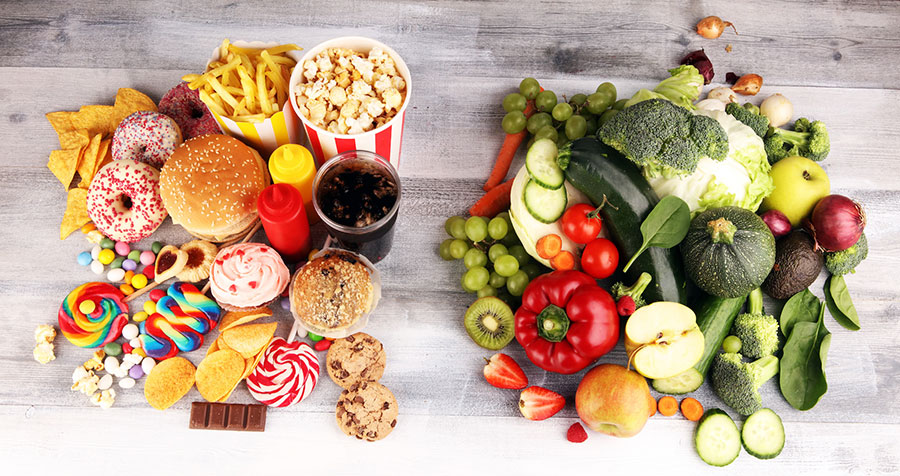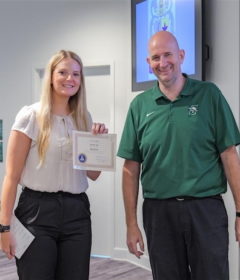Teaching Students About the Importance of Combating Obesity


Stetson Health Sciences Professor Ronette Lategan-Potgieter likes to say if there’s one change people can make to live longer and improve their quality of life, it is preventing obesity.

Lategan-Potgieter, PhD, a professor of practice in Health Sciences and dietitian from South Africa, teaches students in her nutrition classes that obesity causes far more problems than just dealing with extra pounds. In addition to causing diabetes, heart disease and stroke, obesity also causes a low-grade chronic inflammation that prevents the body from working as well as it should.
More than 40 percent of Americans were considered obese in 2017-18, according to the Centers for Disease Control and Prevention. Furthermore, America’s obesity epidemic may be worsening. A recent study by New Mexico State University found that nearly half of U.S. adults have gained weight during the pandemic, due to stress-related unhealthy eating.
“I like to ask students, ‘Do you think diet is important?’ … And then remind them that if they take the “t” away, you can see what happens if you do not pay attention to your diet,” said Lategan-Potgieter, whose students call her “Dr. LP.”
“I like to ask students, ‘Do you think diet is important?’ … And then remind them that if they take the “t” away, you can see what happens if you do not pay attention to your diet.”
-Professor Lategan-Potgieter, whose students call her “Dr. LP”
Optimal Performance
Lategan-Potgieter believes the answer lies in teaching people about the importance of a healthy diet. She teaches about eating the right balance of carbohydrates, proteins and fats. But in addition, she also talks about micronutrients and phytochemicals, which our bodies need to function at optimal levels.
Phytochemicals can be found in fresh produce and other plant-based foods. These foods also provide fiber to feel full without consuming too many calories. But despite the health benefits of fresh produce, a CDC report found only 12.3% of adults ate enough fruit per day. Only 10% ate enough vegetables.

“If there’s one thing that can make us live longer and prevent disease that influences our quality of life, the single biggest contributor is our diet,” said Lategan-Potgieter, who worked as a registered dietitian in hospitals and a reproductive health clinic in South Africa. “What we choose to eat is going to determine to a large extent how long we live and also our quality of life as we get older.”
But the consequences of a poor diet can take years to show up. Heart disease, Type 2 diabetes and other health problems don’t happen overnight. Because there are often no immediate effects of a poor diet, it can be easy for people to put off losing weight. They may delay making necessary lifestyle changes.
“When people get old and they struggle to get up and do things they like, they realize that they should have been more active and shouldn’t have gained this weight,” she said. “And then it’s unfortunately too late for prevention and takes a lot of effort to correct habits and improve health.”
Simple Advice for Combating Obesity
Her advice is simple:
- Stay physically active
- Avoid sugar-sweetened beverages and refined foods
- Eat smaller portion sizes and
- Eat more fruits and vegetables every day.
“It’s really not rocket science,” she added. “I usually tell the students: ‘Make sure you don’t choose your food fast, cheap and convenient.’ We really try and focus on quality. And the easy way is fruit and vegetables – always.”
For people who need to lose weight, she points out that it took time to gain weight. They should expect that it will take time to lose it. She encourages people to hold themselves accountable. Write a letter to yourself and set objectives for the following six months. Explain how much weight you would like to lose and how. Keeping a diary is also a handy way to monitor what you eat and how active you are. This can help you stay accountable and stick to your weight loss plan.
Students in Lategan-Potgieter’s Advanced Nutrition class say information is key. Once they learned more about nutrition, it was easier to change their diets.
Senior Sabrina Ahmed, a Health Science major who hopes to attend grad school, said the class has made her much more aware of following a healthy lifestyle.

“Since I’ve taken the course, I’ve definitely taken more into consideration the kind of micronutrients that I’ve been eating and trying to make sure I have a balance of those in my diet,” she said. “And I’ve been working out since I started the course.”
Added junior Jordan Williams, a Health Sciences major who plays safety on the Stetson Football team: “I just started eating a lot more salads as soon as I got in the class. I used to eat a cheeseburger every day. But I started getting a salad with a slice of pizza – something a little bit healthier.”
-Cory Lancaster



